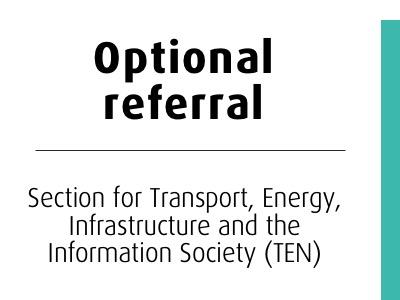European Economic
and Social Committee
EU Hydrogen bank
Background
The European Commission has requested an exploratory opinion to feed into the development process of the EU Hydrogen Bank file. The EESC opinion will explore the different aspects of hydrogen technologies, in order to assess the possible investment needs.
In the past year, the European Commission has shown its deep interest in the development of a European Green hydrogen industry. The renovated ambitions for clean hydrogen supply within the REPowerEU Plan are only one example of campaigns to accelerate this hydrogen reform. The importance of green hydrogen for the sustainable transition has been underlined once again within the 2023 Work Programme, where the Commission announced the creation of a Hydrogen Bank, to invest EUR 3 billion to kick start the European H2 market and achieve the Green Deal ambitions.
The potential of green hydrogen for decarbonisation is unequivocal and multifaceted, spreading from the energy to the mobility sector, which are key for the Green Deal goals. Currently, hydrogen is also on top of the agenda for the green recovery after the pandemic and the energy crisis. Russia's invasion of Ukraine has posed many challenges for Europe, but has also presented a unique opportunity to reshuffle the energy mix. The EU intends to have a leading role in the development of a global green hydrogen industry, and the EESC is eager to play a role and contribute to the design of this vision.
Key points
The EESC:
- welcomes the Commission's idea of setting up a European hydrogen bank and thus creating incentives for the emergence of a hydrogen market. It stresses that fossil energy sources must not be supported with EU funds. The principle "do no harm" must therefore also be applied to funds related to the hydrogen bank. Hydrogen may only be financed with EU funds if the electricity used is generated from sources that are compatible with the Taxonomy Regulation and are considered to make a significant contribution to reducing CO2 emissions.
- is opposed to the use of (non-renewable) energy to power energy-intensive electrolysis processes via the European electricity grids, thereby increasing general energy demand. The EESC stresses that the use of hydrogen should only be promoted in conjunction with the expansion of renewable energy resources and should only be permitted where direct electrification is not possible.
- believes that the cost efficiency of the projects to be funded should not be the only factor in drawing up the guidelines for awarding funding from the hydrogen bank. Rather, a number of other quality criteria, including environmental and social sustainability standards, must be taken into account, particularly provisions on prevailing wages, workforce development, and apprenticeships, to ensure that a larger and more diverse pool of skilled workers has access to good jobs and that workers have the skills needed to achieve clean energy goals.
Additional information
Section: Transport, Energy, Infrastructure and the Information Society (TEN)
Opinion number: TEN/805
Opinion type: Optional
Referral: COM(2023) 156 final
Rapporteur: Thomas Kattnig (Workers - Group II / Austria)
Date of adoption by section: 16 May 2023
Result of the vote: 63 in favour, 2 against, 1 abstention
Date of adoption in plenary: 14-15 June 2023
Result of the vote: 162 in favour, 0 against, 2 abstentions
Contact
Marco Pezzani
Press Officer
Tel.: +32 2 546 9793 | Mob: +32 470 881 903
E-mail: marco.pezzani@eesc.europa.eu
Administrator
Tel.: +32 546 8535
E-mail: giorgiaandrea.bordignon@eesc.europa.eu
